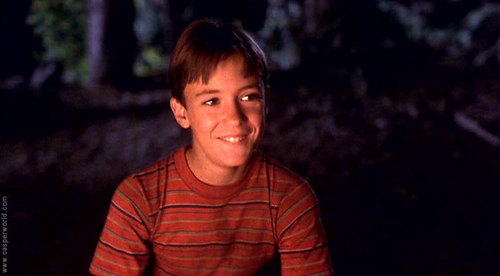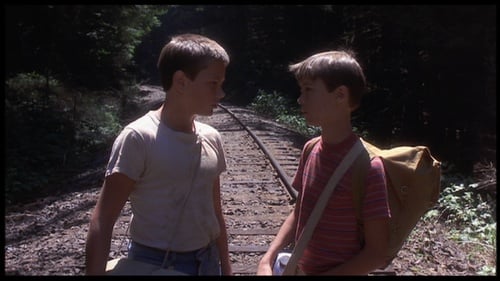My wife and I often share movies with each other that we love, but that the other has never seen. Last night, I finally sat her down and got her to watch a movie that was a huge part of my childhood: Stand By Me. Watching Stand By Me again for the first time in years, I noticed things about it that I hadn’t noticed before, and was able to articulate more clearly why this movie spoke to me so much as a young girl.
For those who haven’t had the pleasure of seeing it, Stand By Me is a 1986 film directed by Rob Reiner and based on the Stephen King novella, “The Body.” In it, a group of four friends—Chris (River Phoenix), Gordie (a pre-TNG Wil Wheaton), Teddy (Corey Feldman), and Vern (Jerry O’Connell)—hear about the location of a dead body belonging to a missing boy around their age, and they set out on a quest to succeed where adult law enforcement has failed by finding the body and “becoming heroes.”
More than that, though, it’s the story about how unique and beautiful friendships are in the years just before adolescence. It’s the story of a group of boys growing up in the 1950s who are the sons of fathers who likely went off to war during WWII and returned damaged. And it’s a story about grief in all its many forms.

Relevant to my personal interests, it’s also a Writer Movie, and I was always a kid who wrote and told stories. Wheaton’s Gordie LaChance was basically an older-boy version of me, and watching him go from a weird, socially awkward, sad kid to becoming an explosion of grief-stricken rage later in the film as he pulls a gun on Keifer Sutherland’s gang leader, Ace, and tells him to “suck my fat one, you cheap dime-store hood” was cathartic for Elementary School Me in ways I can’t even begin to tell you. He exploded with emotion in ways I wanted to, but struggled to.
While Gordie struggled with the death of his older brother, and I didn’t experience death in my immediate family until much later, I understood what it was like to have feelings welling up inside you, but not have a proper outlet. I grew up the youngest girl in a very Catholic, Puerto Rican household where I was expected to defer to everyone else. My parents were much older than my friends’ parents, and had grown up in the 1940s and 50s, coming up in the same American culture that Gordie’s parents did. A culture that frowned upon being too honest, emotional, or vulnerable.
And so, my dad constantly reminded us that “Family business stays in the family.” Even after my parents had a horrible fight. Even when they made me cry. Even when all I wanted to do was talk to my friends about it. To tell someone, anyone how going to bed to screaming every night felt like knives in my belly.
Instead, I learned to put on a happy face. To not rock the boat. To not burden others with my problems. I became the kind of girl who went into her room to cry, so my parents wouldn’t have to see it. I became the kind of girl who hates crying in public. Later, I became the kind of woman who doesn’t cry. Like the LaChance family, my family looked fine, but underneath there were so many things that weren’t, or couldn’t be expressed.
And like Gordie, I learned to channel my feelings through stories.
As I watched the film last night, I noticed how much Gordie’s lines of dialogue sound like “lines of dialogue” that a kid would come up with and think were cool. Like the “suck my fat one” line above, for example. I loved how the centerpiece of the film, the story Gordie tells his friends about a fat kid nicknamed Lardass taking revenge on his small town at a pie-eating contest, was exactly the kind of story a creative twelve-year-old would come up with.
I was also touched by the fact that he thought of his writing the way I thought of my writing when I was a kid. It was “something I did” but not necessarily Something I Did, you know? It was like breathing to me, so it didn’t seem out of the ordinary, or like a special skill. So, in a scene where a deli owner who knew Gordie’s deceased brother asks Gordie if he plays football like he did, Gordie answers no, and the deli guy asks him “What do you do?” Gordie says, “I don’t know,” and I totally understood that. Clearly, he was and always would be a writer – but he never thought of it as something that could be a talent anyone would care about. It’s not showy enough. It’s just something you do for you because you like it.

I remember teachers and other adults that I told that I loved that movie being surprised and saying some equivalent of “Oh, that’s interesting! I thought that was more of a Boy Movie.”
Now, I was the kind of girl who would’ve loved to follow some train tracks to find a dead body (though I probably wouldn’t have been as calm about actually approaching it once I got there). I had adventure in my heart – but girls are raised differently, aren’t they? Certain behaviors aren’t encouraged, and so those behaviors become things we read and dream about. Or see in a movie and wish we could do ourselves.
Some girls were lucky enough to have the courage needed to find those adventures anyway. I wasn’t then. I wasn’t brave enough to be a “tomboy.” I cared way too much about what others thought of me. But what I didn’t do outwardly, or with friends, I did in my head. In my imagination, I was stranded on desert islands, foraging in the woods, or exploring alien worlds. All while envying the boys I knew in school who seemed to run around in the street, coming and going as they pleased.
I suppose I should be grateful. It’s that longing and frustration that made me a writer.
I saw myself in the boys in this film even though they were boys. I saw my friendships with my female friends in the friendship between Gordie and Chris. Hell, even the friendship they had with Teddy and Vern. These boys were definitely starting to try on masculinity, but they were still young enough to be vulnerable in front of each other without being too self-conscious about it.
The boys of Stand By Me exist in that sweet spot where boys and girls are still very much the same, before they’re forced too far down the paths of their respective gender roles.
So, to me, it was never a “Boy Movie.” It was a movie that had boys in it. Boys who were like me.
(image: Columbia Pictures)
Want more stories like this? Become a subscriber and support the site!
—The Mary Sue has a strict comment policy that forbids, but is not limited to, personal insults toward anyone, hate speech, and trolling.—









Published: Jul 5, 2017 05:44 pm